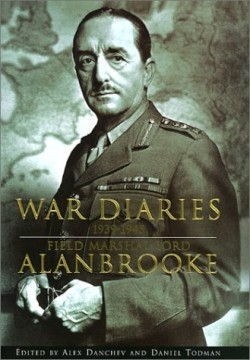War Diaries 1939-1945 Field Marshal Lord Alanbrooke
The publication of this 700-page work will ensure the recognition of the author, who served Churchill as Chief of Imperial General Staff from 1940 to 1945, as architect of Allied victory in World War II. In theory, Alanbrooke, the far-sighted military strategist, and Churchill, the brilliant political leader, were perfectly teamed. In practice, they were often totally at odds. Alanbrooke, a rigorous strategist, sought to concentrate Allied forces, striking sequentially at key points; Churchill, an exuberant improviser-gambler, fought to open fronts all over the map for possible short-term gains. Convinced he wasn’t a politician, Alanbrooke learned to be one to achieve war-winning aims; convinced he was a strategist, Churchill risked political and military capital in straining to dictate strategy. Recognizing each other’s strengths and their Allies’ capabilities, they argued their way to effective policy.
The Diaries pull no punches. Through razor-sharp assessments of politicians, commanders, strategy and battlefield performance, Alanbrooke presents the muscle, sinew, and nervous system of war. Behind the façade of cooperation, each ally pursued different priorities: the Americans focused on Japan and the Pacific; the Australians worried about home defense; the French manipulated to regain France. Alanbrooke’s genius lay in persuading Marshall and Eisenhower to accept a comprehensive Allied strategy: win North Africa, control the Mediterranean, thrust into the soft underbelly of German-held France, advance up Italy, and then (not prematurely) launch D-Day against a Germany weakened in morale, matériel, and manpower.
Growing American participation in the European theater meant that the U.S. became senior partner and decision-maker. A realist, Alanbrooke accepted this, working brilliantly (but not with total success) with Marshall and Eisenhower to promote strategically sound decisions, just as Churchill sought to do with Roosevelt.
As CIGS for five brutal years, Alanbrooke was also general contractor, personnel chief, counselor of wayward generals, and therapist of bruised egos. Telling analyses of strategy and incisive vignettes of Roosevelt, Stalin, Eisenhower, Marshall, Montgomery, and others—but most revealingly of Churchill in all his moods—abound.
Editors Dantchev and Todman’s scene-setting Introduction provides a capsule history of the previous, devious part-publication of a doctored Diary text (1957, 1959). Now uncensored and complete, this behind-the-scenes record is indispensable to understanding strategic thinking among the Allies at the conference table and the front. A key text in an impeccable edition, this book will illuminate numerous other WW II memoirs, including those of Churchill and Eisenhower.
Reviewed by
Peter Skinner
Disclosure: This article is not an endorsement, but a review. The publisher of this book provided free copies of the book to have their book reviewed by a professional reviewer. No fee was paid by the publisher for this review. Foreword Reviews only recommends books that we love. Foreword Magazine, Inc. is disclosing this in accordance with the Federal Trade Commission’s 16 CFR, Part 255.

